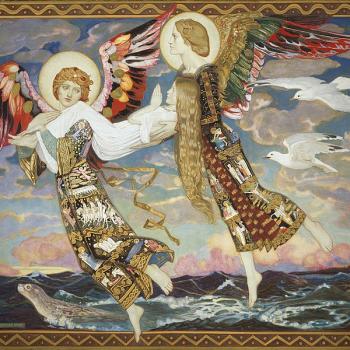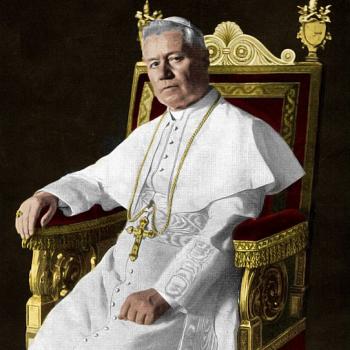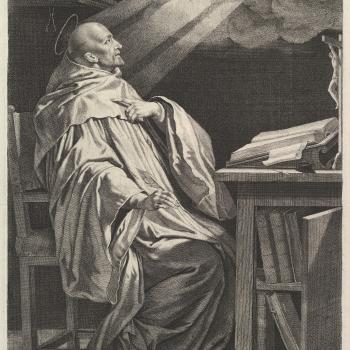It was a silly moment in my meditation
I sat in the adoration chapel where I normally took my holy hour and prayed these spiritual exercises. It was a small chapel with two rows of kneelers of maybe four in each row and there was a small pew and extra kneeler at the back. I sat in an unexpected place in this chapel– on the floor in front of the pew and next to the kneeler; from that position I could see directly down the middle of the chapel and look at the Blessed Sacrament head-on, nothing to obstruct my view or distract me from the One my heart desires. And that was what this meditation is all about.
I had finally come to the last meditation in the Ignatian Spiritual Exercises, the Contemplation on the Love of God. I had spent months meditating on Scriptures through the particular ordering and direction of St. Ignatius of Loyola under the care of my dear spiritual director; I had filled a notebook with my meditations and reflections on them. Many unexpected realizations and God revealing Himself in unexpected ways (for instance, in one mediation on His childhood, He suddenly whipped out a soccer ball to explain in a way I could comprehend).
The Contemplation on the Love of God, or the Contemplatio, presents as its purpose a God Who loves without limit and then invites the meditator to make a generous response of love in return. There are four themes to reflect on in this final exercise: reflection on God’s gifts to us (for example: family, friends, eternal life), God’s self-gift in Jesus, God’s continuing work in the world, and the limitless quality of God’s love. Throughout the other weeks of the exercises, the meditator has focused specifically on Christ, but now the meditator is invited to contemplate God is all of created reality. It was in the midst of this meditation that I happened to open my eyes. From the position I was sitting in, my gaze landed upon my jeans. “God is in my pants,” I thought immediately. God upholds the creation of my pants so that I might be warm and protected and clothed.
That was a definitive moment of understanding for me. I began to understand the deep care God has for us and for His creation simply because He loves us. He even allows our sins to be possible out of this same love. This level of care is beyond all we truly know here on earth. This realization, this understanding has shaped my outlook. I now look to see and understand God in everything as progenitor, upholder, and caretaker; and. this is an unexpected way to see Him.
God is usually found where we least expect Him
I was listening to one of my burnt mixed CDs in my car one day when a song I know very well started playing. The song was “Semi-Charmed Life” by Third Eye Blind, a song released in 1997, a song I’d been listening to for over a decade. That particular time, though, the chorus struck me:
I want something else/To get me through this/Semi-charmed kind of life/Baby, baby/I want something else/I’m not listening when you say/Goodbye
“Oh,” I thought as I listened, “he’s talking about life without God. What he’s really searching for is God.” In this secular song about drugs and sex and chasing after the next rush, the chorus is all about how those things are ultimately unfulfilling and how the singer desperately wants something that will fulfill him.
The thirst for God is everywhere, but not just in His absence; the wonder of God’s presence fills the secular world, too. To use another song as an example, “Let My Love Open the Door” by Pete Townshend is actually supposed to be about God singing a love song to us, His beloved. Most people just hear a simple love song between a man and a woman, but Townshend wrote it with a deeper purpose, to wonder in God’s love for us. Beneath every inch of creation is a God Who pours Himself out in love limitlessly for us, and we should look to find Him there, especially in these unexpected places.
The goal is to become saints
Pope St. John Paul II reminded us deeply of the universal call to holiness, meaning that we are all meant to be saints. To be a saint means to be fully united with God, to be a saint means to be holy. Saints have all sorts of different charisms and missions and ways of relating to the world and times surrounding them– because we are all different people who reflect the vastness and infiniteness of God in different ways. Some are meant for a more ascetic life, some for a more active life, some for a hidden life, and some for a public life. For those of us who live a less monastic life, we have to encounter the world at large daily and encounter those that may not know Christ and, in that way, we must be open to common points to be able to bring these dear ones into the fullness. Even this takes on many forms according to the individual!
It is certainly a nice breath of fresh air, or perhaps a good slap in the face, depending on the circumstances, to find God where He’s not expected. The ability to see God in places where He is not blatantly noticeable does come from a well-formed conscience and moral compass, and presupposes, at least, a minimal relationship with Him. This is the basis for holiness and, ultimately, sainthood.
God is everywhere! He upholds everything! There is absolutely nothing wrong with coming closer to God, unexpectedly, through a song that is not blatantly devoted to Him. The same goes for books and art and movies and all types of media. God upholds it all, so why not see Him everywhere He is. The saints are the ones who saw God in everything– every person, every work, every little thing, every expected and unexpected thing– and responded to that grace and love by making full donations of themselves to God. “God is Love,” St. Teresa Margaret of the Sacred Heart observed. She allowed herself to be consumed by that Love in a response of love; may we look to her as an example.
Receive
The Contemplatio closes with a prayer of St. Ignatius called the Suscipe, which is a Latin word for “receive”:
Take, Lord, and receive all my liberty,
my memory, my understanding,
and my entire will,
All I have and call my own.
You have given all to me.
To you, Lord, I return it.
Everything is yours; do with it what you will.
Give me only your love and your grace,
that is enough for me.
Lord, You are everywhere and in everything; let me see You. Everything I have is Yours, Lord, do with me as You will.
Photo by Joel Muniz on Unsplash













